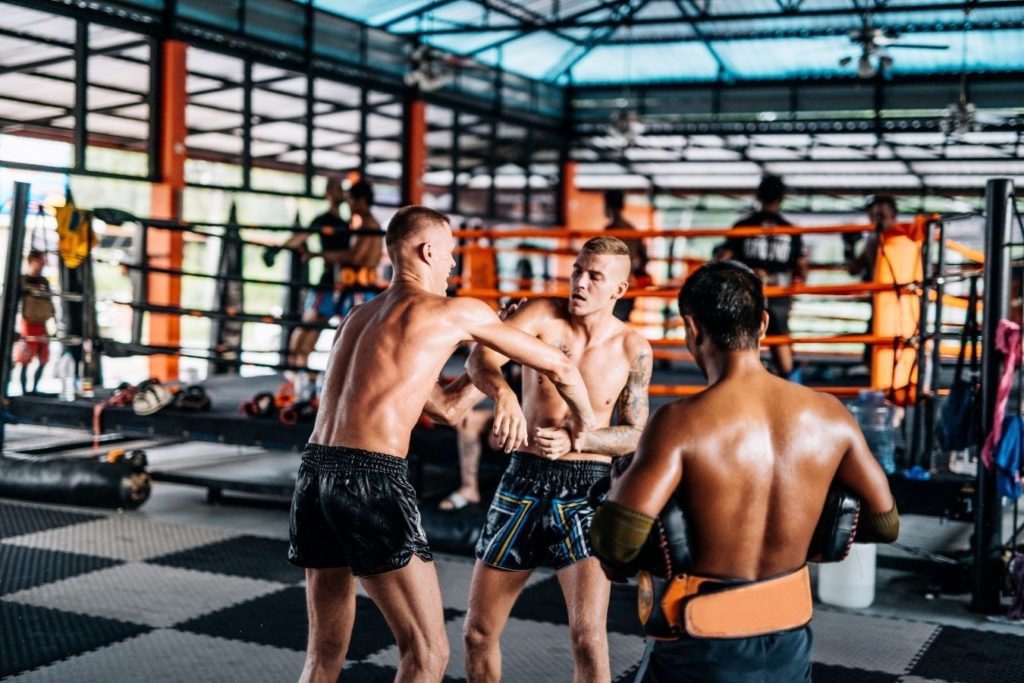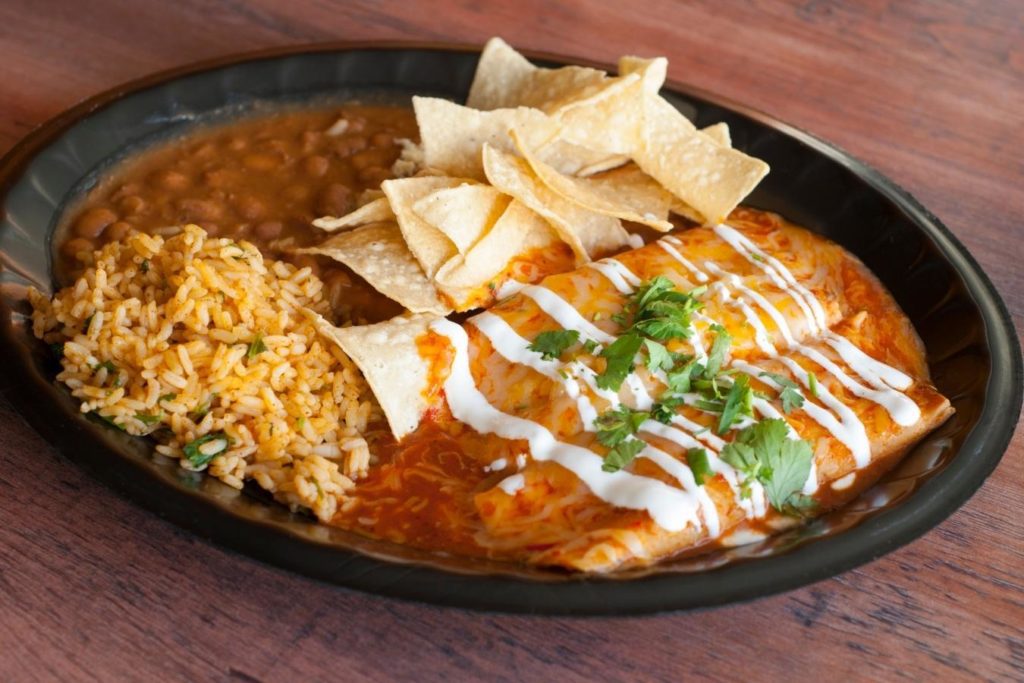Muay Thai fighters are very lean. The long training hours, extra running, and intense skill sessions expend a lot of energy. Is this the reason there are not many highly muscular Muay Thai fighters?
Muay Thai itself does not build muscle. Muay Thai training doesn’t provide the resistance and range of motion needed to stimulate muscle growth. However, supplemental weight lifting is how you can build muscle while training Muay Thai.
So why doesn’t Muay Thai provide an adequate stimulus for muscle growth and what can we do to grow muscle mass while training for Muay Thai?
Can You Build Muscle Doing Muay Thai?

While many Muay Thai classes incorporate calisthenic exercises, Muay Thai training is ineffective for building muscle. There are three main factors that influence muscle growth. That is mechanical tension, metabolic stress, and muscle damage.
Mechanical tension is how much load you can put through the muscle (i.e., how much force you can generate) combined with how large the range of motion is. That means, to maximize mechanical tension, you want to lift as much weight as possible through the longest range of motion possible.
Discover The Little Known Secrets For Unlocking Devastating KO Power!
Heavy hands are built doing these things...
Metabolic stress on the other hand is about the build-up of by-products of anaerobic metabolism in the muscle. To maximize metabolic stress, you must perform many reps.
Finally, muscle damage is a by-product of these two factors. Unfortunately, Muay Thai does not satisfy any of these requirements.
While the clinch may provide a lot of mechanical tension through a load, and metabolic stress through the isometric contraction (think of that burning feeling after a while), there is no range of motion and therefore, little muscle hypertrophy.
How To Build Muscle While Training Muay Thai
But this doesn’t mean you can’t build muscle while training Muay Thai. It just means you will need to pay extra attention to your training, nutrition, and recovery outside of Muay Thai training. So here is how you can build muscle while you train Muay Thai.
Lift Weights
Lifting weights is the obvious solution. Weight training can be manipulated to maximize mechanical tension, metabolic stress, or provide a blend of both. But there is one more factor you need to be aware of when it comes to building muscle, and that is training volume.
Volume is defined as the number of sets multiplied by the number of reps performed. The greater the volume to a certain point, the greater the muscle growth.
For someone who is not training Muay Thai, high-volume weight training is a viable option. But because you are likely training Muay Thai multiple times a week, high-volume weight training will destroy you.
Especially if you are performing compound lifts like squats and deadlifts. So how can you lift weights, get adequate volume, and still gain size?
It would be to perform exercises that don’t elicit a lot of residual fatigue. Assuming your sole goal is to gain some muscle, using mainly isolation and bodyweight exercises will allow you to get the volume you need without carrying a lot of fatigue over to your Muay Thai training.
Here is how a training session can look. The idea is to perform a compound lift with low volume and relatively high intensity to maintain strength and maximize mechanical tension. Following this, volume can be performed in isolation.
A1) Bench Press 3 x 3 @85% 1RM
B1) Hands Elevated Push-Up 4 x 10-20
B2) Chin-Up 4 x 5-10
C1) Triceps Extension 4 x 15-20
C2) Inverted Row 4 x 10-20
Eat A Lot

No amount of training is going to build muscle if you aren’t supporting muscle growth with calories. However, with long and hard Muay Thai sessions, eating a lot can cause you discomfort (and potentially losing your food back out of your mouth during training!).
The solution to this is to eat the majority of your calories after training. If you are training twice a day, the foods you eat between training should be quick and easy to digest. That means a high carbohydrate intake (especially carbohydrates that are low in fiber such as white rice) and lean meat (like chicken breast).
This will mean your food will digest quickly not giving you the feeling of food sitting in your stomach while training.
How much should you eat each day to build muscle? You can estimate your caloric intake by taking your body weight in pounds and multiplying it by 16. This will give you a starting point for your total calories.
Because you are gaining muscle mass on this diet while performing a lot of training, you can lower your protein slightly and raise your carbohydrate intake. When in a caloric surplus, carbohydrates are muscle sparing and you can gain muscle while eating less protein.
You also need plenty of carbohydrates to fuel your training sessions so it’s a win-win situation. So here is how to distribute your macronutrients.
Protein = 0.8g per pound of bodyweight.
Fat = 25% of your total calories.
Carbohydrates = the remaining calories.
1g of protein and 1g of carbohydrate is equal to 4 calories while 1g of fat is equal to 9 calories.
This is how the macronutrient breakdown would look for a 150 lb Muay Thai fighter:
150 x 16 = 2400 calories
Protein = 120g (480 calories)
Fat = 67g (600 calories)
Carbs = 330g (1320 calories)
Recover Hard
If you’re not getting quality sleep, your muscle-building sessions and/or your Muay Thai sessions will suffer. Sub-par training in both and not getting adequate sleep means you will be stifling muscle growth.
Not to mention being under recovered can lead you down the path of injury. Sleep is where muscle growth happens. So, implement these sleep tips to enhance your sleep quality:
- Use blue light filters at night to naturally. These Low Blue Light glasses are the best you’ll find on the market as they have been validated in the scientific research and show better sleep outcomes than other brands.
- Use orange and yellow colored lights. This is an easy way to reduce your blue light exposure at night. I love my Himalayan Salt Lamp for this.
- Eat fast digesting carbohydrates an hour before bed such as rice, pasta, and bread as they can promote sleep. Turkey is a protein you can eat which contains the amino acid tryptophan which can help you fall asleep faster.
- Avoid caffeine close to bed. Its effects can be felt up to 5-6 hours.
- Create a pre bedtime routine. This could be something as simple as reading a book or taking a bath.
- Avoid strenuous exercise before bed. We’ve all done an evening class and struggled to get to sleep that night.
- Set your room up for sleep by keeping it cool, quiet, and dark.
Does Muay Thai Build Muscle?
Muay Thai does not build muscle because it does not satisfy the key mechanisms of building muscle which are mechanical tension and metabolic stress. There is little to no external resistance to overcome so force generation is minimal.
Further, the times when high forces are required, for example in the clinch, there isn’t enough exposure to generate any meaningful stimulus for muscle growth.

